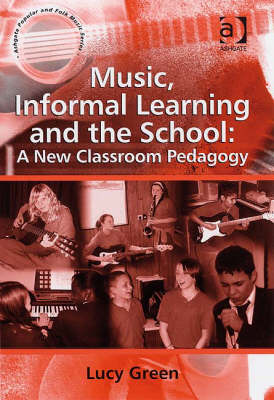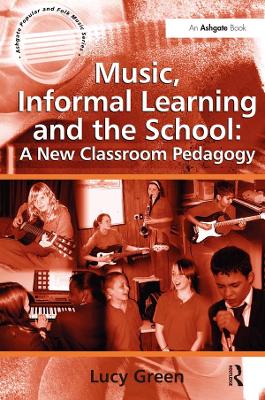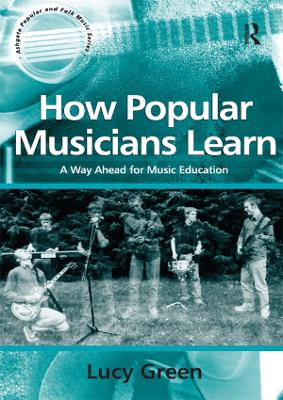Ashgate Popular and Folk Music
3 total works
This pioneering book reveals how the music classroom can draw upon the world of popular musicians' informal learning practices, so as to recognise and foster a range of musical skills and knowledge that have long been overlooked within music education. It investigates how far informal learning practices are possible and desirable in a classroom context; how they can affect young teenagers' musical skill and knowledge acquisition; and how they can change the ways students listen to, understand and appreciate music as critical listeners, not only in relation to what they already know, but beyond.It examines students' motivations towards music education, their autonomy as learners, and their capacity to work co-operatively in groups without instructional guidance from teachers. It suggests how we can awaken students' awareness of their own musicality, particularly those who might not otherwise be reached by music education, putting the potential for musical development and participation into their own hands.Bringing informal learning practices into a school environment is challenging for teachers.
It can appear to conflict with their views of professionalism, and may at times seem to run against official educational discourses, pedagogic methods and curricular requirements. But any conflict is more apparent than real, for this book shows how informal learning practices can introduce fresh, constructive ways for music teachers to understand and approach their work. It offers a critical pedagogy for music, not as mere theory, but as an analytical account of practices which have fundamentally influenced the perspectives of the teachers involved.Through its grounded examples and discussions of alternative approaches to classroom work and classroom relations, the book reaches out beyond music to other curriculum subjects, and wider debates about pedagogy and curriculum.
It can appear to conflict with their views of professionalism, and may at times seem to run against official educational discourses, pedagogic methods and curricular requirements. But any conflict is more apparent than real, for this book shows how informal learning practices can introduce fresh, constructive ways for music teachers to understand and approach their work. It offers a critical pedagogy for music, not as mere theory, but as an analytical account of practices which have fundamentally influenced the perspectives of the teachers involved.Through its grounded examples and discussions of alternative approaches to classroom work and classroom relations, the book reaches out beyond music to other curriculum subjects, and wider debates about pedagogy and curriculum.
Music, Informal Learning and the School: A New Classroom Pedagogy
by Lucy Green
Published 15 May 2008
This pioneering book reveals how the music classroom can draw upon the world of popular musicians' informal learning practices, so as to recognize and foster a range of musical skills and knowledge that have long been overlooked within music education. It investigates how far informal learning practices are possible and desirable in a classroom context; how they can affect young teenagers' musical skill and knowledge acquisition; and how they can change the ways students listen to, understand and appreciate music as critical listeners, not only in relation to what they already know, but beyond. It examines students' motivations towards music education, their autonomy as learners, and their capacity to work co-operatively in groups without instructional guidance from teachers. It suggests how we can awaken students' awareness of their own musicality, particularly those who might not otherwise be reached by music education, putting the potential for musical development and participation into their own hands. Bringing informal learning practices into a school environment is challenging for teachers. It can appear to conflict with their views of professionalism, and may at times seem to run against official educational discourses, pedagogic methods and curricular requirements. But any conflict is more apparent than real, for this book shows how informal learning practices can introduce fresh, constructive ways for music teachers to understand and approach their work. It offers a critical pedagogy for music, not as mere theory, but as an analytical account of practices which have fundamentally influenced the perspectives of the teachers involved. Through its grounded examples and discussions of alternative approaches to classroom work and classroom relations, the book reaches out beyond music to other curriculum subjects, and wider debates about pedagogy and curriculum.
Popular musicians acquire some or all of their skills and knowledge informally, outside school or university, and with little help from trained instrumental teachers. How do they go about this process? Despite the fact that popular music has recently entered formal music education, we have as yet a limited understanding of the learning practices adopted by its musicians. Nor do we know why so many popular musicians in the past turned away from music education, or how young popular musicians today are responding to it. Drawing on a series of interviews with musicians aged between fifteen and fifty, Lucy Green explores the nature of pop musicians' informal learning practices, attitudes and values, the extent to which these altered over the last forty years, and the experiences of the musicians in formal music education. Through a comparison of the characteristics of informal pop music learning with those of more formal music education, the book offers insights into how we might re-invigorate the musical involvement of the population. Could the creation of a teaching culture that recognizes and rewards aural imitation, improvisation and experimentation, as well as commitment and passion, encourage more people to make music? Since the hardback publication of this book in 2001, the author has explored many of its themes through practical work in school classrooms. Her follow-up book, Music, Informal Learning and the School: A New Classroom Pedagogy (2008) appears in the same Ashgate series.


